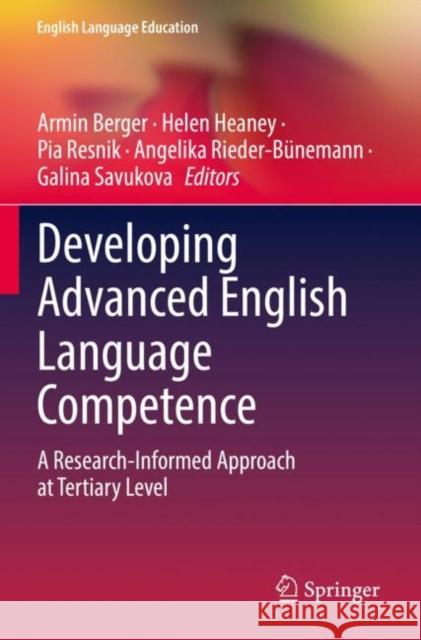Developing Advanced English Language Competence: A Research-Informed Approach at Tertiary Level » książka
Developing Advanced English Language Competence: A Research-Informed Approach at Tertiary Level
ISBN-13: 9783030792435 / Angielski / Miękka / 2023 / 374 str.
Developing Advanced English Language Competence: A Research-Informed Approach at Tertiary Level
ISBN-13: 9783030792435 / Angielski / Miękka / 2023 / 374 str.
(netto: 575,06 VAT: 5%)
Najniższa cena z 30 dni: 539,74
ok. 16-18 dni roboczych.
Darmowa dostawa!
This volume presents a systematic approach to developing advanced English language competence at tertiary level. It includes the reflections of experienced language teachers and teacher-researchers in the English Language Competence programme at the University of Vienna and provides examples of good practice, amalgamating teaching expertise and research with aspects of curriculum design and programme management.The book addresses a growing academic and professional interest in understanding advanced language learning and use. To date, research has tended to investigate advanced proficiency from a specific theoretical viewpoint, for example cognition, psycholinguistic processing strategies, or the assumption of a critical period or the age factor. In contrast, this work examines advanced proficiency from a curricular and instructional perspective by providing a profile of advanced-level language development in a specific institutional context. It brings together three areas of language education: curriculum design, pedagogical practice, and research. Within this triangle, advanced English language education is the focus or, conversely, advanced English language education provides the lens through which links between curriculum design, teaching, and research can be established.
This volume presents a systematic approach to developing advanced English language competence at tertiary level. It includes the reflections of experienced language teachers and teacher-researchers in the English Language Competence programme at the University of Vienna and provides examples of good practice, amalgamating teaching expertise and research with aspects of curriculum design and programme management. The book addresses a growing academic and professional interest in understanding advanced language learning and use. To date, research has tended to investigate advanced proficiency from a specific theoretical viewpoint, for example cognition, psycholinguistic processing strategies, or the assumption of a critical period or the age factor. In contrast, this work examines advanced proficiency from a curricular and instructional perspective by providing a profile of advanced-level language development in a specific institutional context. It brings together three areas of language education: curriculum design, pedagogical practice, and research. Within this triangle, advanced English language education is the focus or, conversely, advanced English language education provides the lens through which links between curriculum design, teaching, and research can be established.











